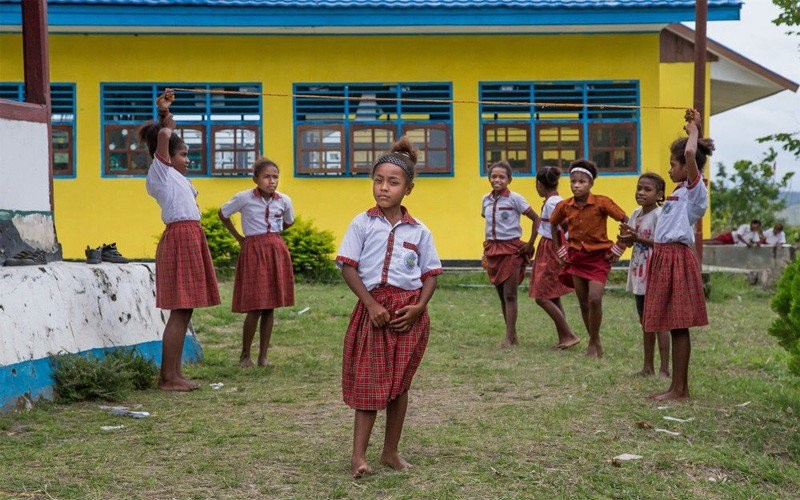Popular Reads
Top Results
Can't find what you're looking for?
View all search resultsPopular Reads
Top Results
Can't find what you're looking for?
View all search resultsJokowi fails to bring peace to restive Papua
Change text size
Gift Premium Articles
to Anyone
P
resident Joko “Jokowi” Widodo has been trying to fast-track infrastructure and economic development in Papua over the last two years, but little has been achieved to prevent human rights abuses from taking place in the country’s easternmost region.
Soon after he took office, Jokowi made an oath that he would not let Papuans continue to suffer as a result of the long-standing “Javacentric” paradigm of development. Thus, basic infrastructure such as roads and railways are being constructed in the resource-rich region.
But, at the same time, the number of reported human rights abuses in Papua continues to increase. This has underscored Jokowi’s hesitancy to promote peace on the island, hurting Papuans who have put their faith in him, the human rights group Setara Institute said Thursday.
Setara Institute data shows that 45 human rights abuse cases were reported in the first nine months of the year, ranging from murders and arrests of activists to torture carried out by Public Order Agency (Satpol PP) personnel. The number is a steep increase from the 16 rights abuse cases recorded last year.
“Jokowi’s biggest failure is that he simply thinks improving Papua can be done through economic and infrastructure development. The problem in Papua is not only about prosperity but also the dignity of its people, which can be realized by treating them equally, not promoting violence,” Setara vice chairman Bonar Tigor Naipospos told a press briefing.
The Indonesian Science Institute (LIPI) has mapped out four major problems that have caused long-standing conflict in Papua, namely the state’s failure to bring prosperity to the region, the discrimination toward and marginalization of native Papuans, state-promoted violence and different interpretations regarding Papua’s integration into Indonesia.
Regarding the findings, LIPI has also broached the idea of a peaceful and inclusive dialogue to resolve conflict in Papua.
The dialogue is expected to involve all stakeholders, including native Papuans, migrants, government institutions, as well as separatist groups such as the United Liberation Movement for West Papua (ULMWP).
Setara Institute’s National Council secretary Benny Soesetyo said Jokowi had more than enough poltical capital to expedite peace talks in Papua, but still lacked the political will to do so.
Benny said Jokowi’s main source of political capital was that he had gained the trust of many Papuans; he went to Papua on his campaign trail and 70 percent of Papuans voted for him during the presidential election. “Also, Jokowi has been successful in consolidating power to support his government. This provides the impetus for the President to initiate peaceful dialogue,” Benny said.
Papua Peace Network (JDP) coordinator Neles Tebay, who was also present at the briefing, said the government had to resolve the problems identified by LIPI in a holistic manner, and not prioritize one above any other.
“As long as the government fails to deal with all the four problems, conflict will continue in Papua and international voices will raise their concerns about Indonesia’s approach to the region, especially in regard to the settlement of human rights cases,” Neles said.
During the 71st session of the UN General Assembly in New York, seven Pacific countries expressed their concern over continuing human rights abuses in Papua, calling on the body to take concrete measures to address the matter and on Indonesia to resolve the problem.
Indonesia, however, has strongly rejected those countries’ claims, saying that their criticism is politically motivated.
Meanwhile, the ULMWP and Indonesia have both tried to garner support from members of the Melanesian Spearhead Group (MSG), who will meet in December to decide whether to grant either ULMWP or Indonesia membership in the group. According to Neles, three of the five members, namely the Solomon Islands, Vanuatu and the Front de Liberation Nationale Kanak et Socialiste (FLNKS) were seemingly in favor of ULMWP being granted membership.










